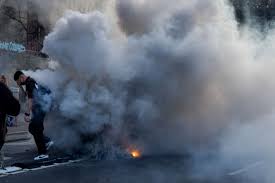Trump deploys 2,000 more National Guard troops in Los Angeles: All you need to know about protests against immigration raids

Los Angeles | June 10, 2025 — Tensions have escalated dramatically in Los Angeles as former U.S. President Donald Trump has announced the deployment of an additional 2,000 National Guard troops in response to growing protests against aggressive immigration raids across Southern California.
This move has sparked nationwide debates, as critics call it a crackdown on civil rights, while supporters defend it as a necessary step for restoring law and order. Here’s a detailed breakdown of what’s happening, why the protests have erupted, and what it means for immigration policy in America.
What Triggered the Protests?
Over the past week, immigration enforcement agencies under Trump’s directive have intensified operations targeting undocumented immigrants in Los Angeles, San Diego, and other parts of California. These raids were part of a broader federal strategy to implement stricter border and deportation policies, which Trump claims are essential to national security.
Videos showing early morning detentions and families being separated have gone viral on social media, sparking outrage and mobilizing thousands of protesters across the state.
Why Are People Protesting?
Civil rights activists, immigrant communities, and human rights organizations argue that the raids are inhumane, indiscriminate, and racially biased. Several local leaders have condemned the operations, saying they violate basic human rights and have created an environment of fear, especially among Latino and Asian-American populations.
“The presence of federal agents in our neighborhoods is terrifying for our children,” said Carmen Ortega, a community organizer in East LA. “This isn’t about law enforcement—this is about intimidation and political theater.”
Trump’s Response: More Troops on the Ground
In a public statement, Trump justified the deployment of 2,000 additional National Guard troops, stating that the protests have “turned violent and unmanageable” in some areas, although on-the-ground reports suggest the majority of demonstrations have remained peaceful.
“The rule of law must prevail,” Trump said during a press conference from his Florida residence. “These are not peaceful protests. These are organized attempts to undermine the security of our nation.”
The National Guard’s mission, according to federal officials, is to assist local law enforcement, manage crowd control, and protect federal buildings from vandalism.
Impact on Los Angeles and Beyond
The deployment has led to heightened tensions between local and federal authorities. Los Angeles Mayor Karen Bass criticized the federal government’s “militarized” response and called for de-escalation through dialogue and community outreach rather than armed presence.
Meanwhile, students, workers, and faith-based organizations have staged walkouts, prayer vigils, and mass rallies in downtown LA, Santa Monica, and even as far as Fresno and Sacramento.
“There’s fear, but there’s also solidarity,” said UCLA student activist Maria Kim. “People are realizing this affects us all—regardless of race or immigration status.”
Legal Challenges and Political Fallout
Several civil liberties groups, including the ACLU, have filed emergency lawsuits challenging the legality of the raids and the troop deployments. They argue that the use of military forces in domestic law enforcement breaches constitutional boundaries.
Politically, the move has reignited debates in Congress. Democrats have condemned the actions as authoritarian, while Trump-aligned Republicans have voiced strong support, framing it as a defense of American sovereignty.
What’s Next?
With protests continuing and tensions still high, many are calling for a national dialogue on immigration reform that balances border security with compassion and human rights. The Biden administration has yet to formally respond to Trump’s recent moves, but sources suggest high-level discussions are underway.
Meanwhile, organizers plan a massive protest this weekend expected to draw tens of thousands of people to the streets of Los Angeles. Community leaders have urged for calm but remain resolute in their demand for the raids to end and for federal troops to withdraw.
Final Thoughts
The situation in Los Angeles is a stark reminder of how deeply immigration remains embedded in America’s political and cultural identity. As protests grow and legal battles intensify, one thing is clear: this debate is far from over, and its outcome could shape U.S. immigration policy for years to come.






